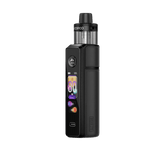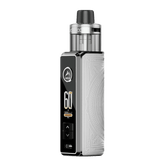Comparing Nicotine & Caffeine
15 Mar 2022
0 Comments
Although caffeine is well known for its psychoactive effects, is nicotine just as damaging? This article focuses on caffeine and nicotine and their effects on the body. Likewise, we will discuss how these two drugs differ and how they are alike.
NICOTINE VS CAFFEINE: WHAT’S SIMILAR AND WHAT’S DIFFERENT
The use of nicotine, of course, can lead to negative consequences due to nicotine’s addictive nature. Smokers know the classic feeling of "I hope I won't die" after their first cigarette. Even though nicotine is relatively safe in small doses, caffeine can be equally harmful depending on the dosage as well.
The other is caffeine, which is a psychoactive drug that gives you that jolt of energy. If taken in large doses, caffeine can be lethal. We are all familiar with the dangers of drinking too much coffee, especially since many people do so. In general, nicotine and caffeine are very similar substances; however, there are a few minor differences, which we will discuss below.
MEDICAL APPLICATIONS
About 100mg of caffeine is in an average cup of coffee. The average cigarette contains around 10 mg of nicotine. While the nicotine content is not high, the caffeine effects are more prominent. If you smoke a cigarette, you feel incredibly relaxed and relaxed. You experience that sensation of satisfaction when the dopamine levels in your brain rise. There is evidence to suggest nicotine can help combat anxiety and depression, but combining it with caffeine can lead to unwanted side effects.
Due to the stimulant properties of these two substances, they can elevate your heart rate quite quickly, especially when combined. Nicotine and caffeine have cancelled each other out at this point, and you're left with nothing but wasted time and money. The consumption of nicotine and caffeine has an interesting health benefit: they both slow Alzheimer's disease progression. There are many reasons they are used, but they are both addictive substances that should be used in moderation.
NICOTINE DELIVERY IN SMOKING COMPARED TO VAPING: ARE THERE DIFFERENCES?
The use of e-cigarettes has replaced tobacco use among many people. Unlike conventional cigarettes, electronic cigarettes vaporize water-based liquids so that they mimic the smoking experience. The amount of nicotine that comes out of vape devices can be adjusted. When you smoke, you have no control over how much nicotine is entering your brain. In general, users who vape report feeling more satisfied because of its ability to control dosage. However, vaping still poses the danger of addiction.
The fact that not all e-liquids contain nicotine makes the transition for many ex-smokers much easier when they reduce their nicotine intake. Besides the physical act of vaping, many people find nicotine-free e-liquids to be sufficient to help them quit smoking.
The main cause of addiction to smoking is not nicotine alone, according to some studies. The nicotine delivery efficiency of tobacco cigarettes is enhanced by the additives present in the cigarette, not just nicotine. The e-cigarette delivers a lower and more controlled dose of nicotine.
If used in moderation, nicotine has health benefits, just like caffeine. We often think of cigarettes as a rite of passage, but it's crucial to understand how nicotine affects our bodies. Smoking can be highly addictive, and excessive consumption can have negative effects. In addition, caffeine has also been shown to be addicting, which means it should only be used when absolutely necessary.
HEALTH HAZARDS OF SMOKING AND VAPING
Despite the similarity of these two products, there are some key differences in their health implications. Because vaping does not require ingesting nicotine aerosols, it is generally regarded as less harmful than smoking. It is being urged by physicians all over the world that smokers give e-cigarettes a try due to their considered safety compared to smoking.
There is a tendency for smokers to smoke cigarettes that contain different additives, such as ammonia. This chemical amplifies the effects of nicotine and increases the likelihood of addiction. In the past few decades, vaping has been associated with lowered cancer risks, as well as diseases like emphysema, tuberculosis, and chronic bronchitis, but it is not beneficial. Sadly, anti-smoking efforts and public health campaigns often blur the distinction between nicotine usage and tobacco consumption, which has led to a misconception that e-cigarettes are also hazardous.
CONCLUSION ON CAFFEINE VS NICOTINE
It is generally not advisable to combine caffeine and nicotine since their effects cancel out one another. 40 years ago, psychiatrist Mike Russell stated, "Smoke for the nicotine, but die from the tar". Despite this, scientists nowadays are trying to elucidate whether or not nicotine addiction by itself is necessarily detrimental. There is not any evidence that ex-smokers experience any major health problems after quitting smoking because they continue to use nicotine patches and gums long after they quit. The long-term effects of vaping on the throat and lungs are still not known, but the smoking-related disease is not caused by nicotine.
Learn more about vaping at Dragonvape.ca
NICOTINE VS CAFFEINE: WHAT’S SIMILAR AND WHAT’S DIFFERENT
The use of nicotine, of course, can lead to negative consequences due to nicotine’s addictive nature. Smokers know the classic feeling of "I hope I won't die" after their first cigarette. Even though nicotine is relatively safe in small doses, caffeine can be equally harmful depending on the dosage as well.
The other is caffeine, which is a psychoactive drug that gives you that jolt of energy. If taken in large doses, caffeine can be lethal. We are all familiar with the dangers of drinking too much coffee, especially since many people do so. In general, nicotine and caffeine are very similar substances; however, there are a few minor differences, which we will discuss below.
MEDICAL APPLICATIONS
About 100mg of caffeine is in an average cup of coffee. The average cigarette contains around 10 mg of nicotine. While the nicotine content is not high, the caffeine effects are more prominent. If you smoke a cigarette, you feel incredibly relaxed and relaxed. You experience that sensation of satisfaction when the dopamine levels in your brain rise. There is evidence to suggest nicotine can help combat anxiety and depression, but combining it with caffeine can lead to unwanted side effects.
Due to the stimulant properties of these two substances, they can elevate your heart rate quite quickly, especially when combined. Nicotine and caffeine have cancelled each other out at this point, and you're left with nothing but wasted time and money. The consumption of nicotine and caffeine has an interesting health benefit: they both slow Alzheimer's disease progression. There are many reasons they are used, but they are both addictive substances that should be used in moderation.
NICOTINE DELIVERY IN SMOKING COMPARED TO VAPING: ARE THERE DIFFERENCES?
The use of e-cigarettes has replaced tobacco use among many people. Unlike conventional cigarettes, electronic cigarettes vaporize water-based liquids so that they mimic the smoking experience. The amount of nicotine that comes out of vape devices can be adjusted. When you smoke, you have no control over how much nicotine is entering your brain. In general, users who vape report feeling more satisfied because of its ability to control dosage. However, vaping still poses the danger of addiction.
The fact that not all e-liquids contain nicotine makes the transition for many ex-smokers much easier when they reduce their nicotine intake. Besides the physical act of vaping, many people find nicotine-free e-liquids to be sufficient to help them quit smoking.
The main cause of addiction to smoking is not nicotine alone, according to some studies. The nicotine delivery efficiency of tobacco cigarettes is enhanced by the additives present in the cigarette, not just nicotine. The e-cigarette delivers a lower and more controlled dose of nicotine.
If used in moderation, nicotine has health benefits, just like caffeine. We often think of cigarettes as a rite of passage, but it's crucial to understand how nicotine affects our bodies. Smoking can be highly addictive, and excessive consumption can have negative effects. In addition, caffeine has also been shown to be addicting, which means it should only be used when absolutely necessary.
HEALTH HAZARDS OF SMOKING AND VAPING
Despite the similarity of these two products, there are some key differences in their health implications. Because vaping does not require ingesting nicotine aerosols, it is generally regarded as less harmful than smoking. It is being urged by physicians all over the world that smokers give e-cigarettes a try due to their considered safety compared to smoking.
There is a tendency for smokers to smoke cigarettes that contain different additives, such as ammonia. This chemical amplifies the effects of nicotine and increases the likelihood of addiction. In the past few decades, vaping has been associated with lowered cancer risks, as well as diseases like emphysema, tuberculosis, and chronic bronchitis, but it is not beneficial. Sadly, anti-smoking efforts and public health campaigns often blur the distinction between nicotine usage and tobacco consumption, which has led to a misconception that e-cigarettes are also hazardous.
CONCLUSION ON CAFFEINE VS NICOTINE
It is generally not advisable to combine caffeine and nicotine since their effects cancel out one another. 40 years ago, psychiatrist Mike Russell stated, "Smoke for the nicotine, but die from the tar". Despite this, scientists nowadays are trying to elucidate whether or not nicotine addiction by itself is necessarily detrimental. There is not any evidence that ex-smokers experience any major health problems after quitting smoking because they continue to use nicotine patches and gums long after they quit. The long-term effects of vaping on the throat and lungs are still not known, but the smoking-related disease is not caused by nicotine.
Learn more about vaping at Dragonvape.ca





